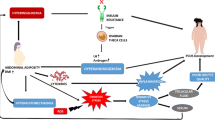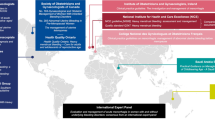Abstract
Background
Subclinical beta-cell (β-cell) dysfunction is an endocrine abnormality and its association with recurrent miscarriages (RM) has not been extensively studied.
Objective
This study aimed to determine the prevalence of β-cell dysfunction and abnormal glucose metabolism [fasting blood glucose (FBG) ≥ 5.1 mmol/L] among non-diabetic women with recurrent miscarriages and to establish if there was an association between RM and β-cell dysfunction and FBG ≥ 5.1 mmol/L.
Methodology
This was a cross-sectional study involving 80 women with miscarriages at ≤ 13 weeks gestation and 80 women with normal pregnancies at ≤ 13 weeks of gestation with at least one successful live-birth and no history of miscarriage (comparison group). Interviewer-administered questionnaire was used to obtain relevant information. From each participant, FBG and fasting insulin were assayed. β-Cell function was computed. The data obtained was analysed using IBM-SPSS version 22.0.
Results
A significantly higher prevalence of β-cell dysfunction and abnormal glucose metabolism were observed among non-diabetic women with RM compared to age-matched controls (38.8% vs 10.0%, P < 0.001) and (27.5% vs 6.3%, P = 0.005) respectively. The mean β-cell function of the cases was 59.0% of the controls (264.41 ± 105.13 vs 447.82 ± 181.24, P < 0.001). Mean FBG was significantly higher in the case-group compared to the controls (4.77 ± 1.14 mmol/L vs 3.58 ± 0.78 mmol/L, P < 0.001). There was a significant association between RM and FBG ≥ 5.1 mmol/L and low β-cell function (P < 0.001).
Conclusion
This study suggests that women with recurrent miscarriages are more likely to have impaired β-cell function and abnormal glucose metabolism (FBG ≥ 5.1 mmol/L).
Similar content being viewed by others
References
Cerf ME (2013) Beta-cell dysfunction and insulin resistance. Front Endocrinol 4:1–12
Stadler M, Pacini G, Petrie J, Luger A (2009) Beta-cell dysfunction in non-diabetic offspring of diabetic patients. Diabetologia 52:2435–2444
Festa A, Williams K, Agostino RD, Wagenknecht LE, Haffner SM (2006) The natural course of β-Cell function in non-diabetic and diabetic individuals: the insulin resistance atherosclerosis study. Diabetes 55:1114–1120
Anne D, Catherine W (2012) Diabetes and endocrine diseases in pregnancy. In: Edmonds DK (ed) Dewhurst’s textbook of obstetrics and gynaecology, 8th edn. Blackwell Publishing, Southern Gate, Chichester, West Sussex, pp 121–136
Moley KH, Chi MM, Mueckler MM, Kelle H, Chi MM, Mueck- MM (1998) Maternal hyperglycaemia alters glucose transport and utilization in mouse preimplantation embryos. Am J Physiol 275:38–47
Saisho Y (2015) β-cell dysfunction : its critical role in prevention and management of type 2 diabetes. World J Diabetes 6(1):109–124
Robajac D, Masnikosa R, Miković Ž, Mandić V, Nedić O (2015) Oxidation of placental insulin and insulin-like growth factor receptors in mothers with diabetes mellitus or preeclampsia complicated with intrauterine growth restriction. Free Radic Res 49(8):984–989
Moley KH, Chi MM, Knudson CM, Korsmeyer SJ, Mueckler MM (1998) Hyperglycaemia induces apoptosis in preimplantation embryo through cell death effector pathways. Nat Med 4:1421–1424
Florez JC (2008) Newly identified loci highlight beta-cell dysfunction as a key cause of type 2 diabetes: where are the insulin resistance genes? Diabetologia 51(1):1100–1110
News S, Smith ML, Schust DJ (2011) Endocrinology and recurrent early pregnancy loss. Semin Reprod Med 29(6):482–490
Ford HB, Schust DJ (2009) Recurrent pregnancy loss: aetiology, diagnosis, and therapy. Rev Obstet Gynecol 2(2):76–83
Craig LB, Ke RW, Kutteh WH (2002) Increased prevalence of insulin resistance in women with a history of recurrent pregnancy loss. Fertil Steril 78(3):487–490
Tian L, Shen H, Lu Q, Norman RJ, Wang J (2007) Insulin resistance increases the risk of spontaneous miscarriages. J Clin Endocrinol Metab 92(4):1430–1433
Negrato CA, Mattar R, Gomes MB (2012) Adverse pregnancy outcomes in women with diabetes. Diabetol Metab Syndr [Internet] 4(1):1. Available from: Diabetology & Metabolic Syndrome
Koning SH, Van ZJJ, Hoogenberg K, Lutgers HL, Klomp AW, Korteweg FJ et al (2018) New diagnostic criteria for gestational diabetes mellitus and their impact on the number of diagnoses and pregnancy outcomes. Diabetologia 61:800–809
World Health Organization (2013) Diagnostic criteria and classification of hyperglycaemia first detected in pregnancy. WHO/NMH/MND/13.2 ed. World Health Organization, Geneva, pp 1–62
Maryam K, Bouzari Z, Basirat Z, Kashifard M, Zadeh MZ (2012) The comparison of insulin resistance frequency in patients with recurrent early pregnancy loss to normal individuals. BMC Res Notes [Internet] 5(1):133–138. https://www.biomedcentral.com/1756-0500/5/133
Esteghamati A, Ashraf H, Khalilzadeh O, Zandieh A, Nakhjavani M, Rashidi A (2010) Optima Cut-off of homeostasis model assessment in insulin resistance (HOMAIR) for the diagnosis of metabolic syndrome: Third National Surveillance of the Risk Factors of Non-communicable diseases in Iran (SuRFNCD-2007). Nutri Metab 7:26–32
Wang Y, Zhao H, Li Y, Zhang J, Tan J, Liu Y (2011) Relationship between recurrent miscarriage and insulin resistance. Gynecol Obstet Invest 72:245–251
Wani AA, Gul I, Jabeen F, Kaul S, Lone FA, Akhter G (2017) Relationship of insulin resistance with recurrent pregnancy loss. Int J Reprod Contracept Obstet Gynecol 6(4):1312–1317
Diejomaoh M, Al-azemi M (2007) Insulin resistance in women with recurrent spontaneous miscarriage of unknown aetiology. Med Princ Pract 16:114–118
Acknowledgements
We acknowledge the residents in the department of Obstetrics and Gynaecology of Jos University Teaching Hospital, Plateau State Specialist Hospital and Fertile Ground hospital/IVF-ET centre for their contributions in the recruitment of the subjects for the study. We appreciate the Research and Ethical Committees for granting us approval for this study. We wish to say thank Mr. Ajiji of Chemical Pathology department JUTH for helping with processing and storage of the samples.
Funding
Self-sponsored.
Author information
Authors and Affiliations
Contributions
AEE: Conceptualization, original manuscript writing, data collection, data analysis/interpretation, and funding. UAA: Conceptualization, data collection, editing and proof reading. BJ: Manuscript review and editing. COE: Manuscript review and editing. CLI: Methodology, laboratory analysis, and interpretation of analysed data. OJ: Data collection. ASA: Supervision and editing. MS: Writing review and editing. All authors commented on previous versions of the manuscript, read, and approved the final manuscript.
Corresponding author
Ethics declarations
Conflict of interest
We declare that we have no conflict of interest.
Ethical approval
Ethical approvals were obtained from the Research and Ethical Committees of the Jos University Teaching Hospital, Plateau State Specialist Hospital, and Fertile Ground Hospital.
Informed consent
Written informed consent was obtained from the patient for publication.
Additional information
Publisher's Note
Springer Nature remains neutral with regard to jurisdictional claims in published maps and institutional affiliations.
Rights and permissions
About this article
Cite this article
Edugbe, A.E., James, B., Akunaeziri, U.A. et al. Beta-cell dysfunction and abnormal glucose metabolism among non-diabetic women with recurrent miscarriages. Arch Gynecol Obstet 301, 559–564 (2020). https://doi.org/10.1007/s00404-019-05407-2
Received:
Accepted:
Published:
Issue Date:
DOI: https://doi.org/10.1007/s00404-019-05407-2




